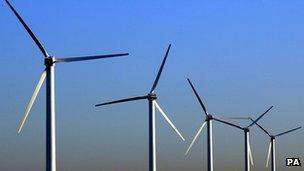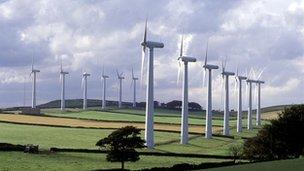Two hundred more wind turbines for South West?
- Published
- comments
Senior figures in the renewable energy industry are calling for nearly 200 more onshore wind turbines in the South West.
To put that in context there are currently just over 100 - so that would mean a threefold increase.
Here's Robert Norris from Renewable UK, external (the trade and professional body for the UK wind and marine renewables industries) setting out his stall:
The cue for this was the government's recently published Carbon Plan, external, which aims to generate 30% of the country's electricity from renewable sources by 2020.
This envisages a combination of onshore and offshore wind helping in the push to meet the target.
At the moment three quarters of Britain's wind power is generated onshore.
According to Mr Norris, though, offshore will be the dominant partner within the next 10 years.
But he insists this still leaves a large gap to be filled by onshore turbines - "the cheapest form of renewable technology which can be deployed on a mass scale in the time frame that we need".
'Giant' turbines
And Mr Norris isn't a lone voice.

There are calls in the renewable energy industry for more onshore and offshore wind turbines
Johnny Gowdy, director at Regen South West, external, agreed that 200 more onshore turbines was "about right" when he joined me on the Politics Show this week.
Cornwall Council , externalis also talking about adding more onshore turbines to the county's sizable existing stock - though "not thousands", according to Cllr Julian German, Cabinet Member for Climate Change.
Everybody agrees that new wind farms are likely to be much smaller clusters of just two or three turbines.
The turbines themselves, though, will be much bigger - like the giants inaugurated by Energy Secretary Chris Huhne, external at Delabole this spring.
Needless to say, the prospect of the region's wind turbine population tripling - and the turbines themselves doubling in height - is a nightmarish vision to some.
Folly or solution?
Steve Bazeley, chairman of Residents against Turbines, external, which campaigned unsuccessfully against the installation of a new generation at Carland Cross near Truro, dismisses wind turbines as "inefficient, unreliable and expensive".

Some believe that wind turbines are unacceptable eyesores
"Wind turbine generation", he says, "is going to prove to be, in the long term, the biggest folly that this generation has ever had to stump up for".
And before you even get on to arguments about efficiency, reliability and cost effectiveness, many people voice the more fundamental objection that turbines are unacceptable eyesores.
It's now clear, though, that onshore turbines won't be standing aside or slipping quietly into retirement to make way for their offshore cousins any time soon.
But getting 200 giant windmills through the planning system will be interesting and eventful to say the least.